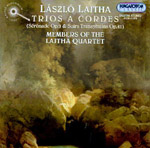The music of László Lajtha has been gaining notoriety recently through recordings of his nine symphonies. On evidence of this captivating Hungaroton release, he was a composer of powerful and original chamber music as well. The two string trios are exemplars of the form, so skillfully written and scored that they often give the impression of a string orchestra, rather than just three instruments (an effect no doubt enhanced by the spacious and wide-ranging recording). The Serenade begins with a peppy Marcia, in a rhythm that will be quite familiar to connoisseurs of Hungarian music (especially from Bartók’s Divertimento). Like his compatriots Bartók and Kodaly, Lajtha’s music is infused with folk elements, while frequently tinged with dissonance. Though primarily upbeat, the Serenade explores varying shades of light and darkness throughout its assorted dance movements (which include a fetching Foxtrot). The last movement reprises the Marcia rhythm, with the opening theme returning to bring the work to a fulfilling close. Transylvanian Nights lives up to its title in the mysterious, phantasmagoric quality of its music. But it’s not about vampires and werewolves, rather the composer’s reaction to the fog-draped and snow-capped mountains of the region. The third (and longest) movement, Autumn Nights, brings to mind the eerie stillness of Bartók’s Bluebeard’s Castle, though it’s all pure Lajtha. The members of the Lajtha Quartet play with all the devotion and enthusiasm that their name implies. Those qualities, combined with their unerringly accurate execution, make this disc a major find.
































